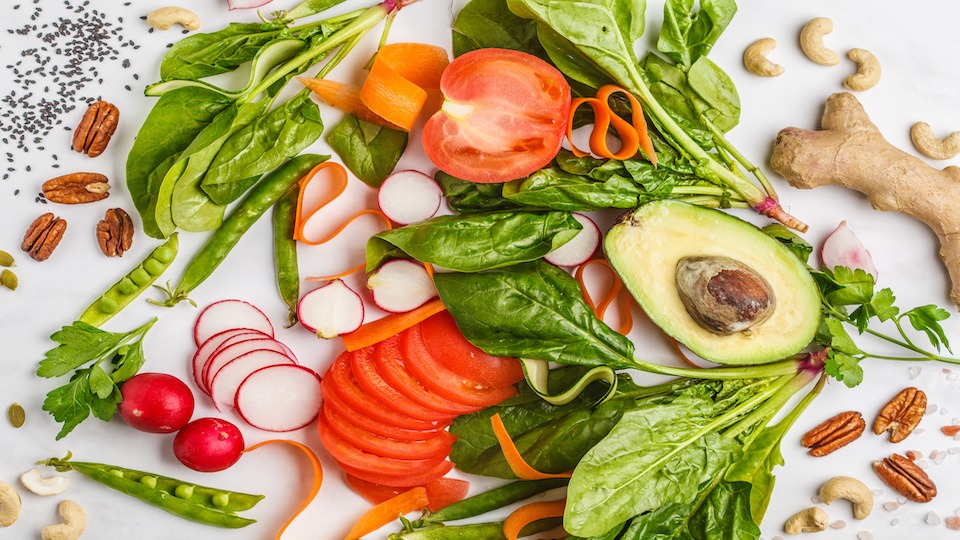One definition of the word “medicine” is a substance or preparation that is used in the treatment of disease. And by that definition, most people think of the pills inside of those little orange bottles that you pick up at the pharmacy. And it’s true. Medications (drugs) can indeed be medicine. But they are certainly not the only thing that you can use to treat disease. In fact, drugs are just one of many disease treatment options out there. As a naturopathic physician, my expertise is in the use of non-pharmaceutical medicines to prevent and treat disease. And in my experience (and the research supports me here), there is no safer or more effective medicine than the use of a minimally processed, plant-based diet. In this article, my team at UpWellness has written you the prescription…
Get started today.
-JL
Here at UpWellness, we constantly proclaim the benefits of a whole foods diet. Real food, straight from the earth, as nature intended. However, processed starches, high sugar, and hormone pumped meat products make up the majority of the modern American diet. In recent years, there has been a shift in thought. Many health-conscious people now see food as medicine and are beginning to understand how to eat the way nature intended. Here are a few of the outstanding health benefits a plant-based diet and tips to help you get started.
Each year, it seems like there is some new diet that is all the rage. Though many of these popular meal plans are actually healthy, it is not a one size fits all situation. Everyone’s body is different and will respond accordingly to various diet structures. Fortunately, there is one thing that health experts always agree on…fruits vegetables are essential for any person.
Before embarking on any new meal plan, remember, a diet should not be viewed as something that you’ll stick to for a time and then return to your old pizza and cookie habits. It is a lifestyle change that may about losing weight but is primarily about feeling great, becoming stronger, and looking after your body for a longer, healthier life.
What is a plant-based diet?
A whole foods plant-based diet is extremely customizable; there is no strict structure to follow or plan to stick to. Adjust your thinking regarding food and follow a few simple principles when you choose what to put into your body.
- Focus on minimally processed food
- Stay away from packaged food whenever possible
- Use locally sourced, organic food whenever possible
- Eat lots of fruits, vegetables, legumes, seeds, and nuts
- Eat a moderate amount of lean meat and fish or cut out meat entirely
- Ditch refined food with added sugar, white flour, and processed oil
- Primarily eat plant products, but not prohibited from animal products such as cheese and eggs
Benefits of a plant-based diet
Filling your body with hearty fuel is one of the single greatest ways to increase energy, improve mood, and take charge of your own health. Check out the top 3 reasons to eat real food today.
Can help you lose weight
Sometimes simple is best. Following the structure of a plant-based diet allows you to be flexible with what you eat while still limiting certain foods that contribute to weight gain. In fact, one study of 65 overweight and obese adults found that those who followed a plant-based diet lost significantly more weight than the control group and were able to keep the weight off during the one year follow-up period. Also, merely cutting out certain foods like soda, processed wheat, and sugary desserts can help you shed those extra pounds.
Help manage diabetes
Type 2 diabetes is one of the most common conditions in the United States. It is often linked to an unhealthy lifestyle and is manageable, preventable, and even reversible with a plant-based diet. One particular study found that subjects following a whole foods diet saw a 50% reduction in type 2 diabetes risk compared to other diets.
Reduce your risk of heart disease
Along with diabetes, heart issues are becoming more and more common in America. Look after your heart and make an investment in your health by transitioning to a plant-based diet. Research backs up these claims, as well. A large study of over 200,000 people showed that those who consumed real foods were significantly less likely to develop heart disease than those who ate processed food.
How to get started
Though it can seem intimidating at first, starting a plant-based diet is fairly simple when you follow these helpful tips.
Clear out your pantry and fridge: Anything with corn starch, processed wheat, unpronounceable chemical additives. It all has to go. Give your boxes of unopened food to a local charity and throw away any opened packages.
Change the way you view meat: Enjoy small amounts of meat as a garnish or side dish next to the main vegetable attraction.
Add more vegetables: Obviously, one of the keys to a plant-based diet is the presence of loads of vegetables. Fill your plate at least halfway at every meal with colorful veggies and leafy greens.
Have you made the switch to a plant-based diet? Tell us about your journey in the comments below!
-The UpWellness Team









